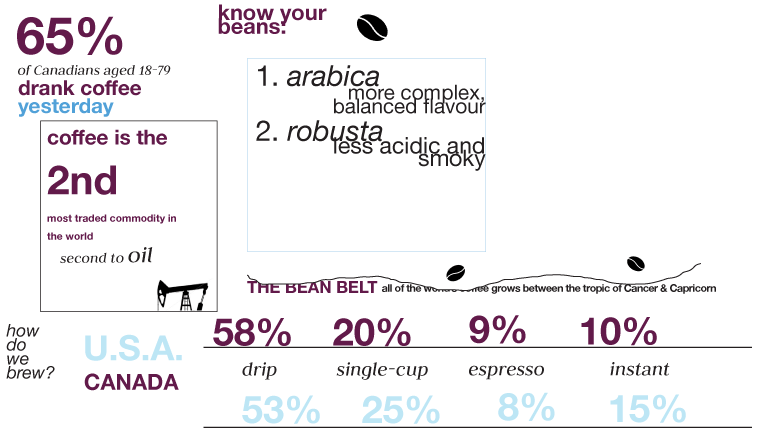
Bean Me, Cleanly
Montreal Hops Aboard the Third Wave Coffee Movement
by Athina Lugez

Infographic by Laura Lalonde
Coffee has become Canada’s fuel. Every day approximately 65% of adult Canadians consume coffee, according to the Coffee Association of Canada. Whether it’s to provide a caffeine boost before an early morning class or to stay awake for a late-night crunch, it’s clear that both Canadians and the world at large love their java—in fact, coffee is the second most traded commodity in the world. But how much do you know about what is inside your cup of Joe?
Coffee is mainly produced in the southern hemisphere, in the latitudes between the Tropic of Cancer and Capricorn, known as the Bean Belt. Over the last decade views on coffee have been reconfigured, particularly with the emergence of the third wave movement, an initiative that focuses on a producing high-quality coffee. Distinctive features of this wave include direct or fair trade relations with farmers, with the goal of producing high quality beans that can earn the designation of “specialty coffee” (scoring 80 points out of 100 on a scale devised by the Specialty Coffee Association of America). These new practices involve improvements at all stages of production, but most important are better working conditions for small farm producers.
Brûlerie Santropol, a Montreal coffee distributor established in 1976, was one of the first adherents to importing, roasting and distributing fair trade and organic coffee, while empowering local and small-scale producers who sustain our coffee addiction. They currently distribute their coffee to Concordia’s student-run café, the Hive.
“When officially fair trade-certified coffee first became available in Quebec, our history and reputation led to Santropol to be the first café to offer it in Montreal,” explained James Solkin, Brûlerie Santropol’s director of business development. “We then decided to try to import and roast fair trade-certified coffee ourselves. For myself, it has always been the fair trade aspect of this business and the direct contact with southern producers which has appealed to me most, which gives meaning to what I'm doing.”
Fair trade is an organized social movement which seeks to help producers in developing countries regulate better trading conditions and promote sustainability—although in recent years, the term has lost some of its legitimacy.
Many producers have neglected their original missions, attracting multinational corporations and private landowners while refusing to improve social standards for farmers. Transnational corporations have caused massive unemployment and led to unregulated trading activities and environmental disasters, while empowering a small nucleus of economic and political entities.
“Conventional fair trade is now being independently redesigned and relaunched in the south by producers themselves,” explained Solkin. “This new initiative is called the ‘Small Producers’ Symbol.’ It is designed to be a real engine for change in both local and global economies, to correct the errors made in conventional fair trade strategies and to return to the original mission and enhance the legitimacy of the movement.
“Our company wholeheartedly endorses and is committed to this new initiative,” Solkin continued. “This system is the first fair trade certification in the world to be owned, operated, designed and governed by small farmers in the south. They maintain extraordinarily high standards of transparency in its governance and administration.”
The Small Producers’ Symbol is an initiative that launched in 2006 by the Latin American and Caribbean Network of Small Fair Trade Producers to effectively dignify the lives of affiliated producers, families and communities. Its democratic structure allows for all members and sectors to participate in the collective interest. Self-managed by local social groups, it fights against the interference and manipulation of outside interest groups.
The group’s economic basis relies on the fact that producers need dignified living with enough food, adequate health and hygiene conditions as well as access to education, housing and sources of employment to generate income in both rural and urban sectors. Running on a small-scale production model, this form of labour generates revenue that allows reinvesting in the local economy and enforcing direct trade relations between producers and consumers, hence strengthening its structure. Today, many young consumers and coffee shops are expressing interest in these alternative business models.
The Third Wave Coffee movement works to bridge the gap between consumers and producers by sharing coffee connoisseurs’ wealth of knowledge. They’re attempting to show increasing support for alternative business models and product certification systems that adhere to positive environmental, labour and development standards.
“Third Wave Coffee culture represents an attempt to personalize and legitimize the coffee-consuming culture, not only by cultivating a discerning culture of 'quality', both in coffee origins and preparation, but also by strengthening links and awareness between producers and consumers,” said Solkin. “Everyone knows by now that our mainstream economic model represents a recipe for global political and environmental disaster.”